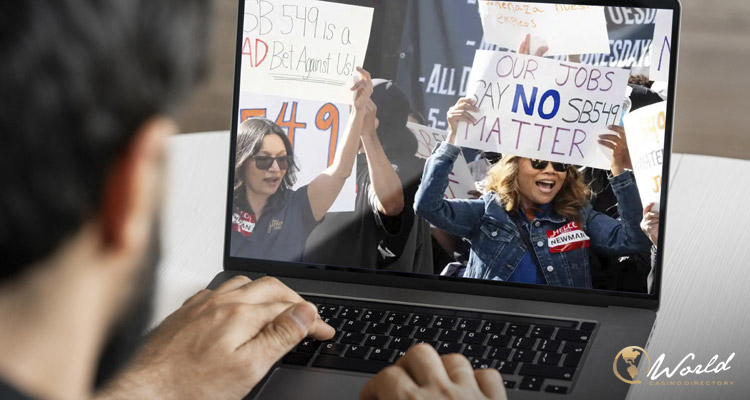Over a hundred Los Angeles-area cardroom workers and their supporters assembled in Fullerton on December 6 to officially protest a legislation they worry could spur a loss of income and jobs for their area of work.
Reason for the rally:
The protest was organized just in front of the office of Democratic state Sen. Josh Newman, whose Senate Bill 549, also known as the Tribal Declaratory Relief Act of 2023, rekindled a conflict that has been going on for decades between cardroom operators and tribal casinos. In this regard, opponents of the legislation commented: “The casinos are simply looking for a way to squash competition from cardrooms.”
Holding signs that say “Say no to 549,” and “549 is a bad bet,” cardroom employees were definitely unshakable about sending their message across. However, the said office was shut down throughout the entire event and Newman did not comment, but said that “the event was orderly.”
Furthermore, currently, federally recognized tribes are allowed to provide lottery games, slot machines and “banked” card games such as traditional blackjack in which the casino is tasked with acting as a bank that processes bets. As for cardrooms, on the contrary, they may just offer “player-dealer” games like pai gow, Texas Hold ‘Em, poker and baccarat.
Senate Bill 549:
The aforementioned Senate Bill 549 would allow tribal casinos to take legal action against cardroom operators they assert are running “banking card games,” which represents the breach of tribal gaming exclusivity and California law. However, at the moment, Indian casinos aren’t allowed to submit civil lawsuits against said cardrooms, the primary reason for this being that they are an autonomous nation, which further means that they don’t possess the legitimate status to do so.
Commenting on the bill, the president of the California Cardroom Alliance, claimed according to the San Gabriel Valley Tribune: “SB 549 is a thinly veiled attempt to close down cardrooms by the same few wealthy tribes who have failed in their repeated attempts to shut us down for years. Cardrooms have been lawfully operating under federal, state and local laws for decades and they’re highly regulated by the California Gambling Control Commission and Attorney General’s Department of Justice. SB 549 already was, in effect, rejected by voters as it contains similar language and intent that was in last year’s Prop 26.”
On a related note, the aforementioned opponents of the legislation said: “It will force cardrooms to address frivolous and costly lawsuits from tribal casinos and could potentially result in hundreds of job losses, putting cardrooms with excessive legal costs out of business.”
Also commenting on the bill, executive assistant to the city manager of Hawaiian Gardens, Shavon Moore-Cage, said: “My city finances would take a big hit if The Gardens Casino were forced to shut down in the face of tribal lawsuits. The tax revenue we get from our cardroom represents 68% of our city’s general fund. For other cities, that might be 18% to 40%, but we are a worst-case scenario. This money funds public safety, after-school programs, senior services and fire services.”
Pending approval:
Nevertheless, the legislation is at the moment in front of the Assembly Rules Committee. In addition, if validated, it likely won’t go into effect prior to the early period of 2024. In this regard, when commenting on the legislation during a December 6 interview, Newman commented that it doesn’t take sides nor answers the question, but simply put, the legislation permits the courts to review various matters and make a decision. Additionally, he added: “I’m carrying the bill, but I have no cardrooms in my district nor tribal lands, so I’m pretty neutral on this. But I sympathize with the argument that this is something the courts should be allowed to decide.”
Moreover, according to Newman, this problem will eventually be sorted out via legal channels. On that note, he said: “I appreciate that this is an important question for both sides and that the action in front of my office is a way of demonstrating it’s important. But my office and Legislature will not decide this. It will be in the hands of California courts.”



